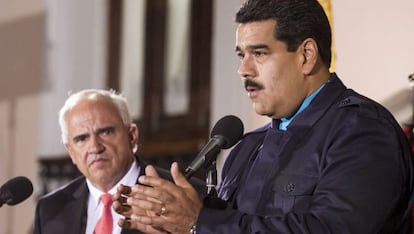Venezuelan president asks Unasur to mediate in relations with US
Nicolás Maduro says conspiracy in Washington aims to topple his government

Venezuelan President Nicolás Maduro has called on the secretary general of the Union of South American Nations (Unasur), Ernesto Samper, to step in to help improve his country’s relations with the United States. Washington and Caracas have had disagreement after disagreement during the chavista regime’s 16 years in power, and in 2010 both countries called back their ambassadors. But what is especially surprising about the request is its timing, coming as Maduro claims that there is an alleged conspiracy in Washington to topple his government.
The Venezuelan president said mediation would help “find an avenue for dialogue” with the Barack Obama administration “in order to build a diplomacy of peace, understanding, and to stop aggression against Venezuela.” Samper, who received the request while in Caracas, showed his support for the initiative.
Washington said it has not received and does not expect to receive any news from Unasur about its possible role as mediator
The news came on Wednesday just as the country was celebrating the 23rd anniversary of Hugo Chávez’s attempt to topple the government of President Carlos Andrés Pérez. Keen to show unity and strength, Maduro appeared at the Venezuelan Military Academy before a formation of soldiers dressed in red, the color associated with the February 4, 1992 disturbances, to read a press release from the Pentagon’s top intelligence officer and thus bolster his claims. “General Vincent Stewart, the officer in charge of the US military intelligence office, testified before the Congress of his country that there are plans to hold demonstrations ahead of the parliamentary elections [slated for the last quarter of 2015],” Maduro began. “Imperialism wants to put an end to the legitimate Venezuelan government,” he said before asking the officers of the armed forces present at the event to “be alert” for “a possible international attack.” “Loyalty and more loyalty,” he asked of the military, ministers and heads of public offices.
According to the Maduro government, Stewart’s statement is a key detail in helping explain that the current discontent of the Venezuelan people has nothing to do with shortages, but with a plot to push Chávez’s successor out of power.
Maduro also asked Ecuadorian President Rafael Correa, Unasur’s president pro tempore, to serve as “a protective shield for peace and democracy in Venezuela.” Foreign ministers will discuss these alleged threats against the chavista regime during meetings to be held next week in Quito.
The Venezuelan president’s statement came in response to Washington’s new sanctions against current and former officials of his administration implicated in acts of corruption such as human rights violations during demonstrations last February and March that left 43 people dead, hundreds injured, and thousands behind bars, including opposition leader Leopoldo López. The Obama administration has not revealed the number of people or the identities of those affected, citing “confidentiality laws” that protect visa applicants.
Soon after Maduro’s announcement, a US State Department official told EFE news agency that “we have not received any contact from Unasur on this matter, nor expect it.” Washington urged the South American government to get in touch “directly.” “We maintain diplomatic relations with the government of Venezuela and the government of Venezuela will be welcome to submit their views directly through those channels,” the official said.
Washington and the Venezuelan opposition believe Maduro is using these initiatives to cover up deep economic and social issues in order to avoid taking corrective measures that may require a change in economic policy. Venezuela faces severe difficulties and the International Monetary Fund expects to see a seven-percent recession in 2015. Inflation has shot up past 50 percent after revenues fell dramatically as a result of a severe drop in the price of crude oil, the country’s main export.
Translation: Dyane Jean François
Tu suscripción se está usando en otro dispositivo
¿Quieres añadir otro usuario a tu suscripción?
Si continúas leyendo en este dispositivo, no se podrá leer en el otro.
FlechaTu suscripción se está usando en otro dispositivo y solo puedes acceder a EL PAÍS desde un dispositivo a la vez.
Si quieres compartir tu cuenta, cambia tu suscripción a la modalidad Premium, así podrás añadir otro usuario. Cada uno accederá con su propia cuenta de email, lo que os permitirá personalizar vuestra experiencia en EL PAÍS.
En el caso de no saber quién está usando tu cuenta, te recomendamos cambiar tu contraseña aquí.
Si decides continuar compartiendo tu cuenta, este mensaje se mostrará en tu dispositivo y en el de la otra persona que está usando tu cuenta de forma indefinida, afectando a tu experiencia de lectura. Puedes consultar aquí los términos y condiciones de la suscripción digital.








































